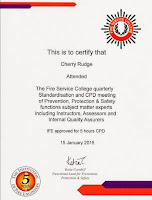November 2022
- Attended Shelter Homelessness & Mental Illness training (online)
October 2022
- Podcast about the connection between ADHD and hoarding behaviours - for Clouds End CIC https://www.cloudsend.org.uk/podcasts/
September 2022
- Represented Fastminds Adult ADHD support group at a SW London NHS/local authority Autism Strategy Workshop
- Commissioned to write a Court Report
November 2021
November 2019
October 2019
Co-delivered Stages 1&2 Professional Hoarding Practitioner Training, Birmingham
June 2019
Co-delivered Stages 1&2 Professional Hoarding Practitioner Training, Birmingham
March 2019
December 2018
October 2018
September 2018
July 2018
June 2018
May 2018
April 2018
March 2018
July 2017
June 2017
May 2017
April 2017

Nov 2015
Sept 2015
Nov 2014

- Attended HHSRS training: Damp, Mould and Excess Cold (CIEH)
- Delivered hoarding awareness training to Occupational Therapists at St Peter's Hospital (Chertsey)
- Delivered hoarding awareness training to Surrey Fire & Rescue Service (Prevention & Fire Investigation teams)
November 2019
- Attended Psychosocial skills and support training for Adults with ADHD (UKAAN - UK Adult ADHD Network)
October 2019
- Attended Basic Welfare Benefits An Introduction (Central Training, London)
- Attended Advocacy Training Level 2 (Advocacy Training)
- Co-delivered Stage 3 Professional Hoarding Practitioner Training, London
September 2019
June 2019
March 2019
- Delivered Professional Hoarding Practitioner Training - Levels 1 & 2 (Birmingham)
- Read Citation for Sheena Crankson at Royal Borough of Kingston's Mayor's Community Award - http://www.adhdkingston.org.uk/about-us.html
December 2018
- Attended Pathological Demand Avoidance (PDA) training & gained Level 2 certificate (PAST Training & Consultancy)
October 2018
- Speaker at the Surrey Antisocial Behaviour Forum - "Understanding Hoarding"
- Attended International Hoarding Conference (Edinburgh)
September 2018
- Manned the Hoarding Ice-Breaker Stand at:
- the Fastminds Neurodiversity Festival (Kingston-upon-Thames)
- the Walton-on-Thames Fire Station Open Day
July 2018
- Delivered Professional Hoarding Practitioner Training - Level 1 (London)
June 2018
May 2018
- Contributed to Jo Cooke's insightful book "Understanding Hoarding"
- Launched the Hoarding Ice-Breaker Form at Hoarding UK's National Hoarding Conference in London
April 2018
- Attended consultancy meeting with Hoarding UK (charity)
- Attended Train the Trainer training (College of Public Speaking, London)
- Gave a talk about hoarding and the Hoarding Ice-Breaker Form to Elmbridge Locality Team
March 2018
- Attended the two day 18th Annual Conference on Hoarding & Cluttering in San Francisco, which included various talks and workshops:
- Dr Michael Tompkins
- Pre-conference Workshop: Applying CBT Techniques When Helping Clients De-clutter Their Lives
- The Essential Coaching Skills: Sorting, Making Decisions, and Following Through
- Dr. Monica Eckfield - Listening and Learning from Participants in the Help for Hoarding Treatment Study
- Chia-Ying Chou - Experiencing Compassion-Focused Therapy for Hoarding
- Donald Davidoff - Thinking Outside the Box: A Neurocognitive Approach to Hoarding Disorder
- Hannah McCabe-Bennett - New developments in hoarding research: A novel approach using virtual reality
October 2017
- Attended NLA Landlord Foundation Course (1 day) & NLA Safer Homes Course (1 day), London
- Attended "The Balance Procedure Level 1" training - Amanda Collins of Restoring Balance, Dorking
June 2017
May 2017
- Ran a facilitated discussion on "Plus One" at the Bracknell Hoarding Support Group
- Mentioned in the acknowledgement section of "Understanding Hoarding" - a new book by Jo Cooke of Hoarding Disorders UK CIC. I contributed various bits and pieces to the book, including a diagram of the ADHD Brain in the context of clutter, disorganisation and hoarding.
- Facilitated a discussion about hoarding at Fastminds ADHD Support Group in Kingston
- Attended a talk on Emotional Health & ADHD by Dr Jo Steer and Dr Amrita Basu at ADHD Richmond Support Group
April 2017
- Started working with Surrey County Council to produce a Hoarding Protocol
- Attended Emotional Resilience for Practitioners training (Changing Lifecourse Training & Coaching)

- Attended a fascinating talk on Anxiety and ASD by Laura Kerbey of The Curly Hair Project, based on the excellent book "Asperger's Syndrome and Anxiety" by Alis Rowe
- Ran a facilitated discussion on "How clutter affects health, and how to ask for help" at Newbury Hoarding Disorders Self-Help Support Group
- Read "The Life-Changing Magic of Tidying: A simple, effective way to banish clutter forever" by Marie Kondo. My verdict? Take from it what you think might work for you. It's unlikely to make much of an immediate difference to people who exhibit hoarding behaviours or suffer with mental health problems.
- Attended Autism Spectrum Conditions training (Surrey County Council Training Team)
- Ran a workshop on "How to ask for help if clutter or disorganisation affects your health" at the annual conference of The Association of Professional Declutterers & Organisers - APDO Conference, London

Nov 2015
- Attended Self-Neglect Awareness training (Surrey Safeguarding Adults Board)
Oct 2015
- Attended Safeguarding Awareness training (Surrey County Council Skills Academy)
- Attended Making Safeguarding Personal - Care Act briefing training (Surrey Safeguarding Adults Board)
- Workshop presenter - Decluttering & Organising for people with ADHD (Unique Surrey ADHD Support Group)
- Attended Training - Meeting the needs of Learners with High Functioning Autistic Spectrum Conditions in the Classroom - Level 3, ongoing (Positive Autism Support & Training)
- Attended Emotion Gyms with a client (First Steps Surrey/Virgin Care/NHS)
- Communication & Assertiveness
- Self Esteem
- Anxiety
- Co-trainer - Hoarding Behaviour Awareness Training for Surrey Family Support Services (Empathic Decluttering)
- Attended Emotion Gyms (with clients) - (NHS Virgin Care) - Mary Frances Trust, Leatherhead
- Communication & Assertiveness (NHS Virgin Care) - Leatherhead
- Self-Esteem
- Anxiety
Apr 2015
- Attended Choice & Control in Compulsive Hoarding training (Central Training)
- Attended Dementia research, services & legacies event at Royal Holloway University (Alzheimer’s Society)
- Solicitors for the Elderly CPD event - NHS Funding (Jennifer Margrave Solicitors)
Mar 2015
- Attended Mental Capacity Act-Awareness Training (Surrey County Council)
- Attended Hoarding, Safety & Ethics for Professional Organisers training (Yourganize)
- Attended Dementia Friend training (Dementia Friends)
- Presented a workshop on Hoarding and The Care Act 2014 at the Annual APDO Conference, London

Feb 2015
- Attended Care Act 2014 training – An Overview (Central Training)
Jan 2015
- Attended a CPD Event - Standardisation & CPD meeting of Prevention, Protection & Safety functions subject matter experts (Fire Service College)
Dec 2014
- Attended Mental Health First Aid Standard training (MHFA), Kingston

Nov 2014
- Co-trainer of Hoarding Awareness Training for Professional Organisers (Clouds End CIC)
- Attended Motivational Interviewing training (Central Training, London)
- Attended Working with Hard-to-Engage Service Users training (Central Training)
Oct 2014
- Represented apdo-uk at the Hammersmith Multi-Agency Hoarding event (Westminster, Royal Borough of Kensington & Chelsea, Hammersmith & Fulham councils)
Sep 2014
- Attended Understanding how to support people with dementia and their carers training (The DementiaTraining Company, for Dementia Friendly Surrey)
- Attended Dementia Awareness Training for Fire & Rescue Service (Surrey FRS)
- Attended The Autism Show, London (Park View Events Ltd)
Mar 2014
- Attended Understanding Chronic Disorganization session at APDO conference (Yourganize)
Memberships &
Committees
Current
- Member of National Autistic Society - www.autism.org
- Trustee for Fastminds Adult ADHD Support Group - www.adhdkingston.org.uk
- Member of CFOA’s Hoarding Working Group (Chief Fire Officer’s Association)
- Helped organised UK Hoarding Awareness Week 2014

Previously
- apdo-uk's Marketing, PR & Partnerships Officer (Oct 2011 – May 2014)
- Member of apdo-uk’s Hoarding Advisory Team
- Member of The Chartered Institute of Marketing (CIM) (2009 – 2014)
   |






